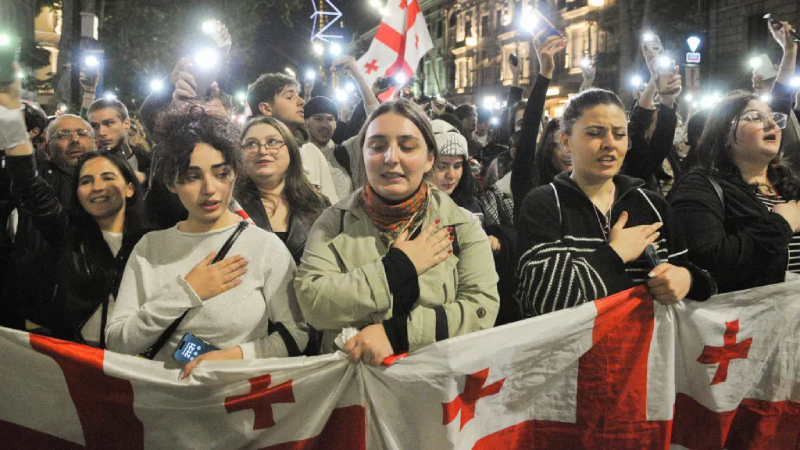
Only Georgians can prevent the country’s move away from the West
By Evelyn Farkas, Fletcher alumna and Executive Director of the McCain Institute
While the world is distracted by the seemingly intractable suffering and war in Gaza, Russian President Vladimir Putin has made his next neo-imperial move in Tbilisi, Georgia. The Georgian people today face their Maidan moment, similar to the one faced by the Ukrainians in 2014, when their pro-Russian leader made a sharp decision to pull the country away from a path to European Union membership and keep it firmly under Putin’s influence. Only the Georgian people — successful demonstration or uprising — can prevent Georgia from turning away from the West, from the European Union and NATO now.
Acting through Bidzina Ivanishvili, Putin’s defacto ally and Georgia’s richest and only oligarch, Moscow has begun the last phase of moving Georgia back under complete Kremlin control. Last week, Georgian lawmakers from the ruling Georgian Dream party, funded and controlled by Ivanishvili, voted to enact a version of Russia’s 2012 “foreign agent law,” designating any organization receiving more than 20 percent of its financial support a “foreign agent.” This law will effectively deny pro-democracy organizations and movements any funds from overseas, especially funds from the United States, European Union and other democratic states and organizations, and is the first step towards crippling and/or defacto shutting them down. It will close the door to European Union membership.
The law was vetoed by Georgia’s president, but the ruling party has already declared they will overturn the veto and adopt the law, likely next week. This comes in the face of statements from the U.S. and European Union threatening sanctions, and the U.S. Congress threatening both sanctions and free trade incentives (if the law is not adopted).
If the law remains on the books, free and fair elections in October will be harder to secure. Opposition parties and independent observers will be severely constrained or banned because of foreign funds they have received. The ruling Georgian Dream party will further consolidate its grip on power and start to act with impunity. Political prisoners like former president Mikhail Saakashvili will be in greater mortal danger.
If the will of the Georgian people, who overwhelmingly want to pursue a pro-western path of integration into the EU and NATO, is defeated, it will have chilling implications for Moldova, its neighbor Ukraine, and the world. Moldovan President Maia Sandu was in Germany and in the process of completing a new “security and defense partnership” with the EU to help her government better defend itself against Russian cyber, informational, political and military interference. Moldova also will hold elections this fall for the presidency and a referendum on joining the EU, which about 60 percent of Moldovans support, despite Russian intimidation and information attempts (analysts expect Russia to spend about $100 million) and the presence of Russian troops in Moldova’s separatist territory Transnistria. Russian Foreign Minister Sergey Lavrov has compared Moldova to Ukraine, declaring Moscow must protect ethnic Russians in Moldova, raising fears of Russian military action.
If Putin succeeds in asserting full political control over Georgia, he could be emboldened to use force against Moldova. Any success by Putin in Tbilisi will impact morale in Ukraine (where many Georgian citizens are fighting or otherwise supporting Ukraine’s war effort), as will any successful political or military attacks against Moldova. If Putin appears to be prevailing, this could also impact politics in the foreign capitals supporting Ukraine and against democratic leaders fighting the aggressive and corrupt autocracies.
The most important element in fighting Russia, China, Iran and North Korea is confidence. The pro-EU opposition leaders and the Georgian people must see and hear that the United States confidently backs their quest for freedom and membership in the democratic transatlantic community. In 2008 when Georgia was invaded by Russia, Sen. John McCain (R-Ariz.) publicly declared the United States was on the side of the Georgian people, asserting “Today, we are all Georgians.” It gave then-President Saakashvilli and the Georgian people the courage to stand up to Moscow and stop Russia’s territorial advances, although Russia still occupies 20 percent of Georgia.
Naturally, the political fight for democracy in Georgia must be fought by the Georgians, but demonstrating political support can provide necessary strength, and the failure to do so at high levels of U.S. and allied governments can have a correspondingly negative impact on political will. Action is also important, so the United States, our allies and partners must sanction the Georgians responsible for subverting the will of the people and their families (who often live or study in EU countries). We must face the facts that our efforts to persuade the Georgian government to reject Putin will never succeed with the current Putin-aligned party in power. Ukraine and Moldova are on the path to EU membership and have increased security relations with Europe and the United States. Georgia is at a crossroads right now. Georgia’s former ambassador to the United States Batu Kutelia texted me last week, “Time is of essence — it is not static standoff — processes are very rapidly deteriorating towards uncontrolled chaos.”
(This post is republished from The Hill.)
